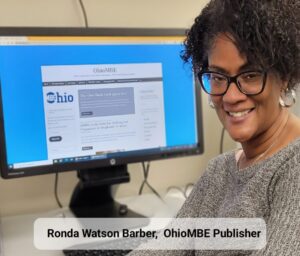By Ronda Watson Barber
OhioMBE Publisher
How committed is the Columbus City Schools Board of Education and its administration to the LEDE program — and to Columbus’ Black vendors?
Judging by the district’s own actions and spending record, the answer is not very.
Under Superintendent Angela Chapman’s lack of leadership, the Local Economically Disadvantaged Enterprise (LEDE) program has been allowed to drift without direction, accountability, or transparency. The numbers tell the story.
In FY25, the district reported $232.3 million in controllable spending, with $41.5 million (17.9%) going to LEDE vendors. While that’s an increase from FY24, it still falls short of the district’s 20% goal — and far below what’s expected in a majority-Black school district funded largely by Black taxpayers.
The summer Capital Improvements report is even more troubling. The district spent $80.9 million in construction dollars, but only $4.6 million went to African-American firms — compared to $17.9 million to Caucasian firms. That’s a nearly 4-to-1 disparity in a district that should be setting the standard for equity and inclusion.
Leadership Failures and Broken Systems
The district’s declining commitment to supplier diversity isn’t accidental. It’s the result of poor leadership decisions made under Superintendent Chapman’s administration — and tolerated by an unresponsive Board of Education.
- Moving Outreach to the Equity Department
The Outreach Office previously operated under Operations, where it was connected to purchasing decisions and departmental projects. When moved to the Equity Department, oversight shifted to an administrator with no supplier diversity experience — someone who ultimately decided to cancel the district’s compliance tracking software.That system — used successfully by the City of Columbus, COTA, the Columbus Airport Authority, and the Columbus Zoo — provided real-time reporting and accountability. Its cancellation was a setback for transparency.But here’s the truth: Columbus City Schools has always compiled LEDE data manually. Purchasing has never used an automated or modernized reporting process. Even with millions of public dollars at stake, the district continues to rely on spreadsheets and guesswork to track who gets paid. - Loss of Institutional Knowledge
The retiring Outreach Coordinator, who ran the program for years, was never given an exit interview. Her departure took with it decades of experience, historical data, and critical community relationships — all lost because leadership didn’t value or document her work. - A One-Person Department
The Outreach Office has always been a staff of one. For years, a single employee managed vendor certification, good-faith compliance, reporting, communications, and community engagement — without adequate resources, staffing, or administrative support. Instead of expanding the department or investing in technology, the district allowed the position to sit vacant for nearly ten months — leaving the program dormant from March 2024 to September 2025.To explain the inactivity, Superintendent Chapman claimed the office’s “foundation is being built.” But how do you rebuild the foundation of a program that has existed for over 20 years? The LEDE program didn’t need rebuilding — it needed support and leadership.
Community Partnerships Severed
For decades, the Outreach Office worked hand-in-hand with community partners to connect vendors and contractors with the district. Those relationships have now been severed.
The trust once built through collaboration has been replaced with silence. Community partners, small business advocates, and LEDE firms have been left in the dark — with no communication, updates, or invitations to participate.
I’ve personally witnessed this erosion of trust. For years, during my weekly Certification 101 classes, I highlighted the Columbus City Schools certification program and encouraged small businesses to become certified vendors. I’ve since removed that slide from my presentation — because I no longer trust the process.
I also used to introduce class attendees to the Outreach Coordinator so they could begin building relationships with the district. That practice has stopped, because there is no relationship to build.
The current Outreach Coordinator finally contacted LEDE vendors nine months after assuming the position. Nine months of silence in a district that claims to prioritize inclusion.
Even now, it remains unclear what outreach activities he has participated in since his arrival. There have been no vendor workshops, no public engagement, and no measurable collaboration with the business community.
A Leadership Void
The superintendent and board have allowed the LEDE program to wither under the guise of “transition.” Their silence and inaction send a clear message to the small, Black, and local businesses that have long supported the district: you are no longer a priority.
Good-faith efforts can’t exist without outreach, communication, and access. Yet there have been no vendor notifications since March 2024, no detailed reports on department participation, and no accountability for ongoing disparities.
If this is what the district calls progress, it’s a hollow claim built on neglect.
Time for Accountability
The district cannot continue to boast about diversity while dismantling the systems that make it possible.
The LEDE program is not a talking point. It’s a legal, ethical, and economic commitment to fair opportunity — one that Columbus City Schools continues to fail.
Until Superintendent Chapman and the Board of Education take responsibility for the damage done to this program — and to the trust of the Black business community — their “commitment to equity” will remain nothing more than a slogan.
just my thoughts…
Discover more from OhioMBE
Subscribe to get the latest posts sent to your email.
